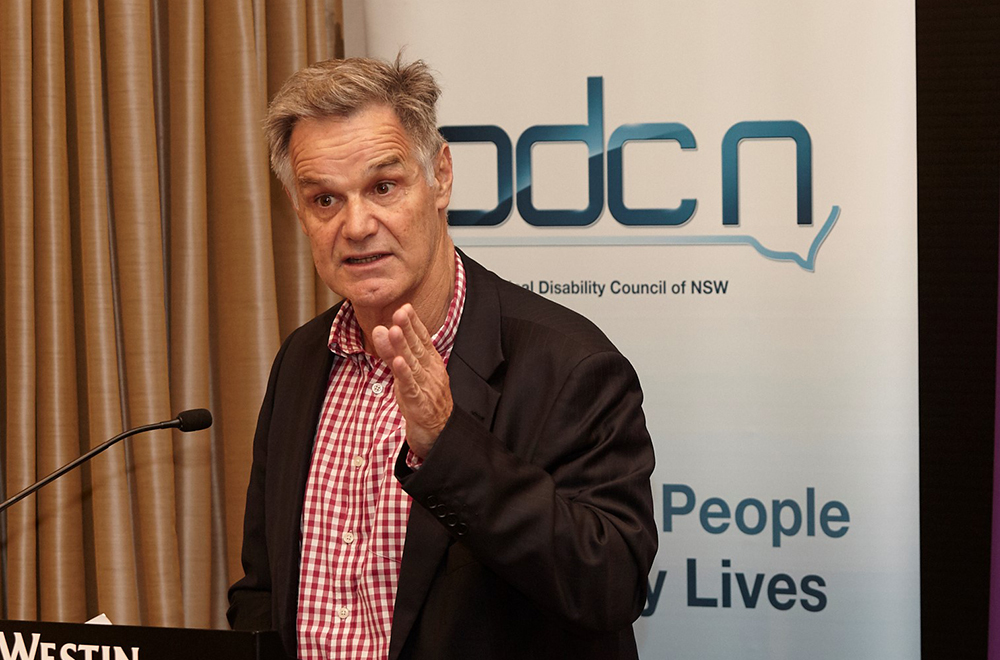Evidence from a NSW Legislative Council Inquiry has found that disability reforms associated with the NDIS is resulting in greater strain on community services, according to NSW Disability Discrimination Commissioner, Steve Kinmond (pictured). Speaking at the Physical Disability Council of NSW AGM, Kinmond said it was apparent that these strains are not always due to inadequate supports by disability services. “They can be related to the current system change which needs appropriate repositioning of responsibility for provision of community supports to mainstream services. While I agree that these shifts are necessary, they present significant risks to people with disability in the short-term.”
He said it was essential for a comprehensive approach to addressing these heightened risks, particularly while mainstream services are building their expertise and capacity “Community advocacy agencies have played, and will continue to play, a vital role in this regard and their advocacy has resulted in impressive reforms.”
However, it was also important to recognise that some, but not all, of the issues affecting supports for people with disability relate to the intersection between the NDIS and mainstream NSW service systems, including ongoing debates about Commonwealth versus State and Territory responsibilities.
“From what we see in our work, it is the coalface experience and outcomes for people with disability that is critical to get right. System performance and outcome measures need to be robust and publically reported. For NSW and the Commonwealth, the role of effective independent review and monitoring activity also requires more detailed consideration,” he said.
While acknowledging the important role of the Disability Council in the existing governance arrangements, particularly in ensuring people with disability are directly involved in the desired change process, he noted that the council sits within the Department of Family and Community Services [FACS], rather than playing an advisory role across government, and an independent body. “I believe that this needs to be addressed and I have no doubt regarding the essential role community disability advocacy bodies’ play, and will need to continue to play, in this sphere.
“From my vantage point, there is a vital ongoing need for accessible and effective advocacy services for people with disability in relation to mainstream and specific disability services. In terms of my role, advocacy bodies provide me with an important ‘reality check’ regarding issues affecting people with disability,” Kinmond said.
PDCN president, Chris Sparks called for guarantees from the Coalition and the Labor Party that disability advocacy will continue to be funded as it is in Victoria, Queensland and Western Australia. “We need to make a lot of noise with NSW politicians and only have a few short months to do it. Start by writing to your local member and other politicians and the council has collateral to assist with this,” he said. He also invited people to join the ‘Stand By Me’ campaign set up to thwart NSW Government funding cuts to disability organisations.“A lot of the work we do is unseen and takes years to take effect but we are the government’s eyes and ears when it comes to physical disability” he said, “and doubtless the cheapest consulting firm they engage. We fix things that confront common issues affecting people with disability and work with government and stakeholders to help put them right.”
Also speaking at the AGM was executive officer, Serena Ovens who said while the funding continues until 2020 it was only a short reprieve. “Even with the rollout of the much-hailed NDIS, only 10 per cent of people with disability receive funding under the scheme. The other 90 per cent will be without services or supports come 2020.” Ovens said the NSW Disability Advocacy Alliance is committed to continuing its campaign in the lead-up to the state election, and is calling on the government to show that 20 per cent of their voting members in the NSW community actually matter. “To meet the long terming funding of our sector the $13 million we are calling for is effectively a ‘rounding error’ on the current massive surplus.”

